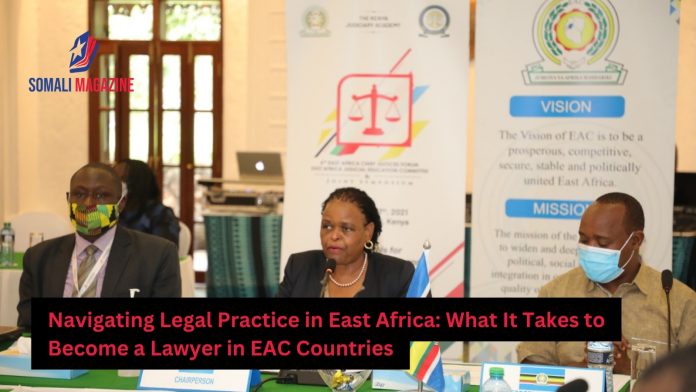Facebook Twitter (X) Instagram Somali Magazine - People's Magazine
Practicing law in the East African Community (EAC) requires a deep understanding of the legal frameworks governing each member state, as well as compliance with professional standards set by national bar associations. The EAC, comprising Kenya, Uganda, Tanzania, Rwanda, Burundi, South Sudan, and the Democratic Republic of Congo, has made strides toward harmonizing legal practice, but each country maintains distinct requirements for admission to the legal profession.
In Kenya, aspiring lawyers must complete a Bachelor of Laws (LL.B) degree from a recognized university, followed by a postgraduate diploma at the Kenya School of Law. Admission to the bar requires passing the Advocates Training Program (ATP) and undergoing pupilage before being admitted to practice by the Law Society of Kenya. Uganda follows a similar path, with law graduates required to attend the Law Development Centre (LDC) for a postgraduate diploma before qualifying for the bar.
Tanzania mandates that law graduates complete a one-year internship before sitting for the bar exam administered by the Council for Legal Education. Rwanda, on the other hand, requires candidates to undergo a professional training program at the Institute of Legal Practice and Development (ILPD) before being admitted to the Rwanda Bar Association. Burundi and South Sudan have their own legal education and licensing processes, often influenced by French and common law traditions.

Despite efforts to streamline legal practice across the EAC, cross-border legal work remains complex. Lawyers seeking to practice in multiple jurisdictions must navigate varying admission requirements, including obtaining special licenses or partnering with local firms. The East African Law Society (EALS) has been advocating for greater regional integration, pushing for mutual recognition of legal qualifications and standardized admission procedures.
Legal professionals in the EAC must also stay updated on evolving regulations, particularly in areas such as commercial law, human rights, and international arbitration. The East African Court of Justice (EACJ) plays a crucial role in interpreting regional treaties and resolving disputes, offering lawyers opportunities to engage in cross-border litigation.
As the EAC continues to expand economic and legal cooperation, efforts to harmonize legal practice are expected to gain momentum. Lawyers across the region are encouraged to participate in professional development programs and engage with regional legal institutions to enhance their expertise and competitiveness in the evolving legal landscape.

